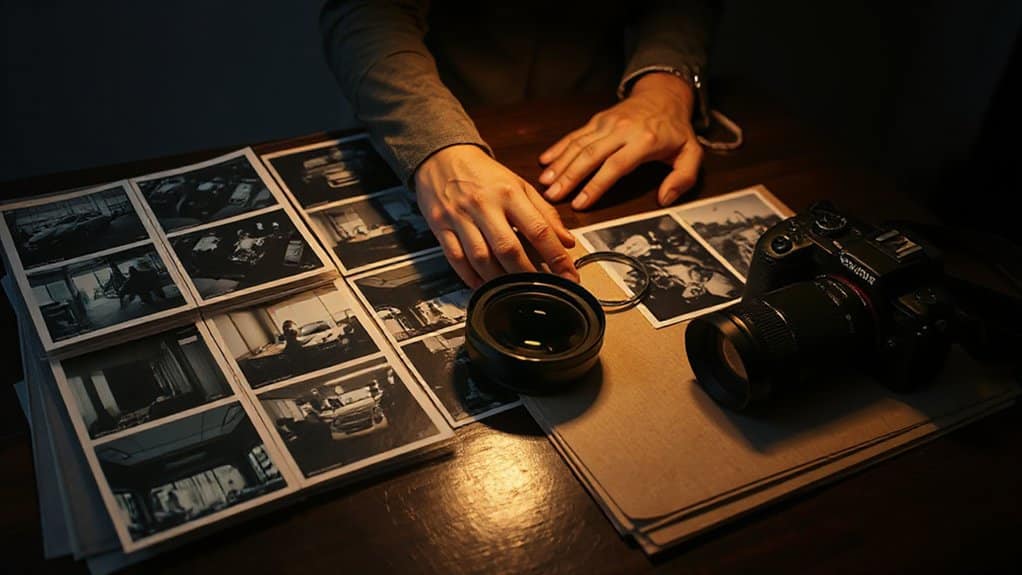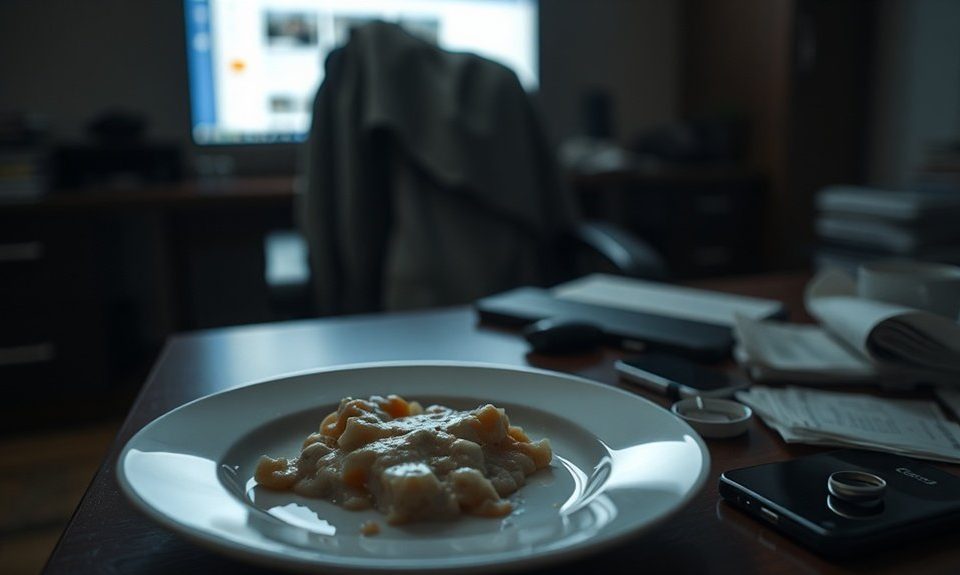Private investigators repeatedly witness suspicious spouses making identical costly mistakes that destroy evidence and compromise legal cases. Most clients have unrealistic expectations about surveillance timelines and seek immediate proof without understanding investigative processes. They often tamper with digital evidence, violate privacy laws, and escalate dangerous domestic situations through premature confrontations. Emotional devastation leads to poor decision-making that jeopardizes both personal safety and legal outcomes. Understanding these professional insights transforms speculation into actionable intelligence.
Key Takeaways
- Emotional devastation leads to unrealistic expectations about surveillance timelines – investigations require patience and systematic approaches, not immediate results.
- Personal safety assessments are crucial in escalating domestic situations before proceeding with any investigative activities or confrontations.
- Evidence gathering must follow legal boundaries and privacy laws to ensure findings are admissible rather than just emotional ammunition.
- Financial deception typically accompanies marital betrayal, so comprehensive asset searches often reveal hidden accounts and suspicious spending patterns.
- Professional documentation and chain of custody procedures are essential for evidence to withstand legal scrutiny in court proceedings.
Cheating Spouse Investigation Services – In Order of Need

How often do spouses approach private investigators with unrealistic expectations about surveillance methods and timelines? Most arrive emotionally devastated, seeking immediate proof rather than understanding the investigative process requires patience and methodology.
Experienced investigators prioritize services based on genuine need. Personal safety assessments come first—domestic situations can escalate dangerously. Emotional support resources follow, as clients often require professional counseling before proceeding. Communication strategies help determine whether investigation is necessary or if relationship issues stem from misunderstanding.
Legal advice consultation precedes surveillance to understand privacy concerns and evidence admissibility. Investigators emphasize financial implications—comprehensive surveillance costs thousands. Many cases involve false accusations born from insecurity rather than genuine infidelity.
Trust rebuilding remains impossible without addressing the emotional impact of suspicion itself. Professional relationship counseling often proves more valuable than surveillance footage. Furthermore, advanced evidence collection techniques highlight the importance of having comprehensive and legally admissible documentation should a situation escalate to legal proceedings.
Phase 1: Initial Suspicion – “I Think My Spouse Is Cheating”
When initial suspicion arises, private investigators typically begin with thorough background checks and research to establish behavioral patterns and identify potential inconsistencies in the subject’s stated activities. Covert surveillance becomes the primary investigative tool, allowing professionals to document actual movements and interactions without detection. Location data gathering through Global Positioning System (GPS) technology provides concrete evidence of where the subject travels, creating an objective timeline that either supports or contradicts the spouse’s stated whereabouts. Additionally, the integration of advanced tools with traditional methods enhances the ability to gather comprehensive evidence during this critical phase.
Background Checks & Research
The moment a spouse begins questioning their partner’s fidelity, private investigators recommend conducting systematic background research before taking any direct action. This preliminary investigation involves examining publicly available information through social media profiles, employment records, and financial transactions. Professional private investigator tools include reverse phone lookups, address verification, and social network analysis to establish behavioral patterns.
Effective spouse trustworthiness assessment requires documenting inconsistencies in stories, unexplained expenses, and changes in routine. Investigators emphasize reviewing phone bills, credit card statements, and travel records methodically. This foundational research creates a timeline of suspicious activities while maintaining emotional distance from volatile situations.
Most importantly, this phase determines whether professional surveillance becomes necessary or whether concerns stem from miscommunication rather than infidelity.
Covert Surveillance
Once background research confirms suspicious patterns, private investigators deploy covert techniques that require precise timing and strategic positioning. Professional surveillance involves maintaining visual contact while remaining undetected, often requiring multiple vantage points and vehicle rotations. Investigators document movements, meeting locations, and behavioral changes through photographs and detailed logs.
Surveillance ethics demand strict boundaries regarding privacy laws and evidence admissibility. Private investigators cannot trespass on private property or use illegal recording devices. They monitor public spaces where subjects have no reasonable expectation of privacy.
Effective covert surveillance reveals authentic behavior patterns rather than forced confrontations. Investigators observe natural interactions, documenting frequency of suspicious activities and identifying potential third parties. This methodical approach provides concrete evidence while protecting the client’s legal interests and emotional well-being throughout the investigation process.
Location Data
Digital footprints often provide the first concrete evidence when spouses begin questioning their partner’s fidelity. Location tracking has become increasingly sophisticated, creating detailed patterns of movement that reveal inconsistencies in stated whereabouts. Private investigators recognize that modern technology generates extensive data trails through various sources.
Common location data sources include:
- Smartphone GPS history and app usage
- Vehicle navigation systems and onboard computers
- Credit card transactions with timestamps and locations
- Social media check-ins and geotagged photos
- Fitness trackers and smartwatch movement logs
While this information proves invaluable for verification, privacy concerns complicate its legal acquisition. Investigators must navigate strict boundaries regarding consent and ownership. Spouses often discover discrepancies between claimed locations and actual digital evidence, providing the foundation for deeper investigation into relationship concerns.
Global Positioning System (GPS)
GPS tracking represents the most precise method for monitoring a spouse’s actual movements versus their stated whereabouts. Modern devices provide real-time location data with accuracy within several feet, revealing discrepancies between claimed destinations and actual visits. However, privacy concerns create significant complications. Installing GPS tracking devices on vehicles or personal belongings without consent violates reasonable expectations of privacy in most jurisdictions.
Ethical considerations weigh heavily on investigators who understand the technology’s invasive nature. While GPS evidence can definitively establish deception, the method potentially damages trust irreparably. Legal regulations vary substantially by state, with some requiring two-party consent for tracking devices. Private investigators advise spouses to consult attorneys before implementing GPS surveillance, as illegally obtained evidence becomes inadmissible in divorce proceedings and may result in criminal charges.
Phase 2: Gathering Evidence – “I Need Proof”

Once spouses reach the evidence-gathering phase, private investigators deploy an extensive arsenal of forensic techniques to document infidelity. Modern investigations center on digital footprints through mobile device forensics, computer analysis, social network monitoring, and cloud storage examination. Physical surveillance has evolved to include drone technology, creating multiple layers of documentation that courts and clients recognize as credible proof. Investigators must ensure they adhere to legal and ethical guidelines to protect the rights of all parties involved during this sensitive process.
Mobile Device and Cell Phone Forensics
When suspicions about a spouse’s fidelity reach a breaking point, many individuals turn to the most revealing source of evidence available: their partner’s mobile device. Professional investigators understand that mobile forensics tools and cell phone tracking capabilities can expose hidden communications, deleted messages, and location histories that reveal patterns of deception.
Private investigators recognize that modern smartphones contain extensive digital footprints:
- Text messages and instant messaging apps that may contain intimate conversations
- GPS location data showing frequent visits to unexplained addresses
- Browser history revealing dating sites or suspicious searches
- Call logs documenting frequent contact with unknown numbers
- Photo galleries potentially containing compromising images
However, investigators emphasize that accessing another person’s device without permission raises serious legal concerns. Professional mobile forensics requires proper authorization and expertise to guarantee evidence remains admissible.
Computer Forensics
While mobile devices capture immediate communications, computers often harbor deeper digital secrets that reveal the full extent of a spouse’s deceptive behavior. Private investigators conduct thorough digital footprint analysis, examining browser histories, cached files, and deleted documents that spouses believe are permanently erased. Email accounts, social media logins, and financial records frequently remain accessible through saved passwords and automatic login features.
Most individuals lack adequate cybersecurity awareness, leaving trails of compromising evidence across multiple platforms. Investigators recover dating profiles, intimate correspondence, and suspicious financial transactions that paint a complete picture of infidelity. Computer hard drives store months or years of deceptive activity, providing timestamps and detailed documentation that mobile devices cannot match. This digital archaeology often produces the most compelling evidence in matrimonial investigations.
Social Network Forensics
Beyond traditional digital storage, social media platforms create permanent records of behavior that cheating spouses rarely consider when engaging in deceptive activities. Social media monitoring reveals patterns through timestamps, location tags, and interaction histories that contradict stated whereabouts.
Professional investigators examine digital footprint evidence across multiple platforms:
- Check-ins at restaurants, hotels, or locations during “work meetings”
- Tagged photos with unidentified individuals at suspicious times
- Private message timestamps that align with unexplained absences
- Deleted posts recovered through cached versions and screenshots
- Friend additions coinciding with behavioral changes
The permanence of digital records means temporary deletions often leave recoverable traces. Platform algorithms create detailed behavioral profiles, tracking when users are active, who they message most frequently, and relationship status changes. These digital breadcrumbs form thorough timelines that either confirm or dispel suspicions definitively.
Cloud Forensics
Cloud storage services create an invisible web of synchronized data that unfaithful partners frequently overlook when attempting to conceal their activities. Photos automatically upload from phones to family-shared accounts, revealing location metadata and timestamps that contradict stated whereabouts. Deleted messages often persist in cloud backups, accessible through recovery methods that circumvent local device deletion. Document sharing histories expose collaborative activities with third parties, while browser synchronization across devices maintains search histories and saved passwords.
However, cloud security measures increasingly protect personal information, and data privacy laws restrict unauthorized access to accounts. Investigators must navigate complex legal frameworks when pursuing cloud-based evidence. Shared family accounts provide legitimate access points, yet individual accounts require proper authorization. Understanding cloud architecture helps spouses recognize potential evidence sources while respecting legal boundaries during relationship investigations.
Drone Surveillance
Overhead surveillance transforms relationship investigations by capturing activities from angles that traditional ground-based observation cannot achieve. Drone capabilities enable investigators to monitor subjects discreetly across expansive areas, documenting patterns that reveal hidden truths about suspected infidelity.
Aerial surveillance provides extensive coverage that ground-level methods cannot match:
- Remote property monitoring without trespassing concerns
- Wide-angle documentation of meeting locations and duration
- Nighttime infrared capabilities for after-dark activities
- Real-time tracking across multiple locations seamlessly
- High-resolution imagery capturing license plates and faces
Professional investigators emphasize that drone operations require proper licensing and adherence to aviation regulations. The technology excels at documenting outdoor activities, parking lot meetings, and travel patterns between locations. However, privacy laws restrict surveillance near residential windows and private property boundaries, making timing and positioning critical for gathering legally admissible evidence.
Surveillance Technology Installation & Deployment
When traditional surveillance methods prove insufficient, professional investigators deploy sophisticated technology installations that transform ordinary environments into extensive monitoring systems. Modern surveillance equipment includes miniaturized cameras concealed within everyday objects, GPS tracking devices with real-time capabilities, and audio recording systems virtually invisible to untrained eyes. Technology trends favor wireless solutions that transmit data instantly to remote monitoring stations, eliminating physical evidence recovery risks.
Professional investigators strategically position these devices in vehicles, workplaces, and frequently visited locations. Installation requires precise timing and intimate knowledge of the target’s routine patterns. Each placement considers ideal coverage angles, power source accessibility, and retrieval logistics. Advanced systems integrate multiple monitoring points, creating thorough surveillance networks that capture movement patterns, communications, and interactions previously impossible to document through conventional observation methods alone.
Phase 3: Building the Case – “I Found Evidence, Now What?”
Once initial evidence surfaces, private investigators shift focus to extensive documentation and corroboration. This phase requires systematic collection of digital evidence, thorough asset and bank searches, and meticulous due diligence to establish patterns of behavior. The investigator’s role expands to include locating additional witnesses or parties while building a defensible case that can withstand legal scrutiny. Furthermore, the legal implications of infidelity must be considered, as they play a crucial role in shaping the outcome of any potential divorce proceedings.
Digital Evidence Collection
Screenshots, browser histories, and social media activity form the backbone of modern infidelity investigations, yet most people handle this evidence with all the finesse of a sledgehammer. Digital footprint analysis requires methodical precision, not emotional desperation.
Evidence preservation follows strict protocols that amateur sleuths routinely violate. Phone snooping without proper documentation renders findings legally worthless. Private investigators understand that digital evidence must be:
- Captured with metadata intact using specialized tools
- Documented with timestamps and chain of custody records
- Stored on separate devices to prevent tampering claims
- Authenticated through technical verification processes
- Collected without violating privacy laws or court orders
The difference between admissible evidence and emotional ammunition lies in methodology. Professionally gathered digital evidence withstands legal scrutiny, while smartphone screenshots taken during tearful confrontations dissolve under examination.
Asset Searches
Financial deception typically accompanies marital betrayal, yet most suspicious spouses focus exclusively on emotional evidence while overlooking monetary manipulation. Private investigators recognize that unfaithful partners systematically relocate assets before discovery, establishing hidden accounts through elaborate financial networks. These professionals methodically trace income streams, examining tax returns, bank statements, and property records to identify discrepancies between reported earnings and lifestyle expenditures.
Asset valuation becomes vital when spouses discover offshore accounts, cryptocurrency wallets, or undervalued business interests. Investigators document these findings through forensic accounting techniques, creating thorough financial profiles that reveal the true scope of marital assets. They understand that emotional betrayal often masks calculated financial preparation for departure, making exhaustive asset searches essential for protecting innocent spouses from deliberate impoverishment during divorce proceedings.
Bank Searches
While asset searches reveal the existence of hidden financial resources, bank searches provide the granular transaction details that transform suspicions into documented evidence. Bank account analysis becomes the microscope through which investigators examine spending patterns, revealing behaviors that contradict stated whereabouts or relationship commitments.
Financial irregularities emerge through systematic examination:
- Unexplained cash withdrawals preceding supposed business trips
- Regular payments to unfamiliar individuals or businesses
- Hotel charges in locations never mentioned to spouse
- Restaurant bills for two when supposedly dining alone
- Gift purchases beyond typical household expenses
These detailed records create irrefutable timelines that either confirm or dismiss suspicions. Each transaction tells part of a larger story, building a thorough picture of actual behavior versus reported activities that spouses desperately need to understand.
Due Diligence
Raw evidence alone rarely constitutes a complete case. Professional investigators understand that due diligence practices require systematic verification of findings through multiple sources. A photograph captures one moment, but establishing patterns demands extensive documentation over time. Phone records reveal contact frequency, yet context emerges through cross-referencing financial transactions, location data, and behavioral observations.
The due diligence importance becomes evident when emotions cloud judgment. Spouses often jump to conclusions after discovering fragmentary evidence, potentially damaging relationships or legal proceedings. Investigators methodically build cases by corroborating details, eliminating alternative explanations, and documenting chains of evidence. They verify witness credibility, authenticate documents, and establish timelines that withstand scrutiny.
This thorough approach protects clients from acting on incomplete information while ensuring any confrontation or legal action rests on solid, defensible ground rather than speculation.
Locates
How do spouses locate additional evidence once initial findings surface? Private investigators emphasize that effective location tracking requires a systematic approach and patience. Evidence gathering becomes more targeted when suspicious spouses understand their partner’s patterns and vulnerabilities.
Successful locate operations focus on these critical areas:
- Financial transaction patterns at specific merchants or locations
- Digital footprints including GPS data and check-ins on social platforms
- Vehicle tracking through toll records and parking receipts
- Communication logs revealing consistent contact times and locations
- Physical evidence found in predictable hiding spots
Investigators observe that emotional spouses often rush this phase, compromising potential discoveries. The most revealing evidence emerges when suspicious partners methodically document their findings rather than confronting immediately. Strategic patience during location tracking yields thorough evidence that withstands scrutiny during difficult conversations ahead.
Phase 4: Legal Preparation – “I’m Ready to Take Action”
When spouses reach the decision to pursue legal action, private investigators shift their focus from evidence gathering to courtroom preparation. This phase requires investigators to organize findings into legally admissible formats while coordinating with attorneys to guarantee proper documentation standards. The investigator’s role expands to include litigation support services and process serving capabilities that bridge the gap between investigation and legal proceedings. This collaboration ensures the adherence to legal responsibilities, which is crucial for presenting a strong case in court.
Litigation Support
Private investigators transform from evidence gatherers into strategic allies once spouses decide to pursue legal action. Their litigation support strategies extend far beyond collecting proof—they become integral to case preparation and courtroom success.
Effective evidence presentation requires meticulous organization and expert testimony preparation. Investigators collaborate closely with attorneys to guarantee every piece of documentation meets legal standards and withstands scrutiny.
Key litigation support services include:
- Preparing thorough evidence timelines and chronologies
- Providing expert witness testimony about investigation methods
- Organizing digital evidence for maximum courtroom impact
- Coordinating depositions and witness interviews
- Maintaining chain of custody documentation
Experienced investigators understand that compelling evidence loses value without proper presentation. They bridge the gap between raw findings and persuasive legal arguments, transforming personal betrayal into actionable court documentation that protects their clients’ interests.
Process Server Support
Beyond gathering and presenting evidence, many private investigators also provide process server support to guarantee legal documents reach their intended recipients. When marriages dissolve into legal proceedings, proper legal document delivery becomes essential for moving forward with divorce, custody, or restraining order cases.
Process server responsibilities extend beyond simply handing papers to someone. Professional investigators understand evasion tactics unfaithful spouses often employ when avoiding service. They locate individuals who deliberately change addresses, alter routines, or hide behind family members. These investigators possess the persistence and strategic thinking necessary to assure service occurs within legal timeframes.
Their dual expertise proves invaluable during emotionally charged situations. They combine investigative skills with legal knowledge, understanding both where to find reluctant recipients and how to execute service properly. This prevents costly delays that could derail legal proceedings when betrayed spouses need swift resolution.
Phase 5: Divorce/Custody Proceedings – “I Need Help With Custody”
Child custody battles often hinge on demonstrating each parent’s actual caregiving capabilities and living conditions rather than courtroom testimony alone. Private investigators document daily routines, school pickup patterns, and home environments to establish factual records of parental involvement and child welfare. These investigations focus on objective evidence that courts can evaluate when determining the child’s best interests. Impartial assessments by investigators play a crucial role in evaluating each parent’s ability to provide a stable environment for children.
Childcare Investigation (for custody disputes)
Custody battles transform loving parents into adversaries willing to weaponize their children’s wellbeing for legal advantage. Private investigators document parenting concerns that courts demand substantiated with evidence rather than emotional testimony.
Childcare safety investigations focus on observable behaviors and environmental factors:
- Neglect patterns during supervised visits or exchanges
- Substance abuse affecting parental judgment and child welfare
- Inappropriate living conditions or unsafe household environments
- Documentation of verbal or emotional abuse toward children
- Evidence of parental alienation tactics against the other spouse
Investigators maintain careful distance from family dynamics while gathering factual evidence. They photograph living conditions, document pickup and drop-off interactions, and observe parent-child relationships without interference. Courts require objective documentation over subjective accusations, making professional investigation essential for establishing legitimate safety concerns versus vindictive allegations.
Additional Information About {var1}

Private investigators frequently encounter requests for information that extends beyond marital investigations into community research and family planning considerations. Spouses often ask for detailed reports on neighborhood safety ratings, property values, and school district performance when preparing for potential relocation during divorce proceedings. These inquiries typically emerge when one parent seeks to establish residence in an area that strengthens their custody position or when families need extensive data to make informed decisions about their children’s educational and residential future. Additionally, understanding the importance of professional childcare investigations can significantly bolster a parent’s ability to choose a safe environment for their children during such transitions.
Best Neighborhoods in {var1}
Location determines access to surveillance opportunities, neighborhood watch participation, and escape routes—factors that seasoned investigators recognize as critical when building infidelity cases. Certain residential areas provide ideal conditions for discreet monitoring while maintaining subject awareness.
Investigators prioritize neighborhoods offering:
- Multiple vantage points with natural cover
- Limited security cameras that could compromise operations
- Accessible parking without drawing attention
- Moderate foot traffic for blending purposes
- Clear exit strategies when situations escalate
Neighborhood safety influences investigation duration and evidence quality. Well-lit streets with active community involvement create challenges for covert operations but increase witness availability. Local amenities like coffee shops, parks, and shopping centers provide legitimate reasons for investigator presence. Upscale areas often feature enhanced security systems requiring specialized equipment and techniques. Suburban developments with consistent architectural patterns offer predictable sight lines but limited concealment options for extended surveillance periods.
Best Schools in {var1}
Educational institutions serve as critical surveillance zones where investigators frequently document evidence of extramarital relationships. Best schools and top universities create environments where suspicious spouses often encounter former flames or develop new connections through academic programs. Investigators monitor college admissions events, extracurricular activities, and student resources gatherings where targets frequently arrange clandestine meetings. School rankings events and scholarship opportunities ceremonies provide cover for illicit encounters, as subjects claim legitimate educational interests while meeting paramours. Private investigators utilize campus surveillance techniques, documenting interactions at libraries, cafeterias, and parking areas. These educational settings offer perceived safety for cheating spouses who believe academic environments provide natural explanations for their presence, making thorough documentation of their actual activities essential for building complete evidence.
Frequently Asked Questions
How Much Does a Private Investigator Typically Charge for Infidelity Cases?
Private investigator fees for infidelity cases typically range from $75 to $200 per hour, depending on location and complexity. All-encompassing investigations often cost $2,000 to $10,000 total. Fees comparison reveals surveillance work commands premium rates, while basic background checks cost less. Investigator qualifications greatly impact pricing—licensed professionals with specialized training charge more than unlicensed individuals. Geographic location, case duration, and required equipment also influence final costs for matrimonial investigations.
Can I Legally Install Tracking Software on My Spouse’s Phone?
Installing tracking software on a spouse’s phone without consent typically violates federal and state wiretapping laws, regardless of marriage status. Legal implications include potential criminal charges and civil liability. Ethical considerations involve fundamental privacy violations and breach of trust within the relationship. Most jurisdictions require explicit consent from the device owner before monitoring. Accessing someone’s communications without permission often constitutes illegal surveillance, even between married partners.
Will Hiring a Private Investigator Guarantee I’ll Find Evidence of Cheating?
Hiring a private investigator does not guarantee discovery of infidelity evidence. Professional investigators possess specialized skills and tools, yet their findings depend entirely on what actually occurs during surveillance periods. Evidence quality varies greatly based on subject behavior, timing, and circumstances. Many investigations conclude without confirming suspicions, while others reveal different relationship dynamics than initially suspected. The investigator’s role involves methodical documentation of observable facts, not manufacturing proof where none exists.
How Long Does a Typical Cheating Spouse Investigation Take to Complete?
Investigation duration varies greatly based on several critical factors influencing the timeline. Simple cases with obvious patterns may conclude within days, while complex situations requiring extensive surveillance can extend weeks or months. Target’s schedule predictability, available evidence, and cooperation level directly impact timeframes. Geographic location, budget constraints, and specific objectives also determine completion speed. Most investigations reach meaningful conclusions within two to four weeks of consistent monitoring.
Can My Spouse Find Out That I Hired a Private Investigator?
Professional investigators maintain strict confidentiality protocols, yet complete secrecy cannot be guaranteed. Digital footprints, financial records, and behavioral changes may reveal the investigation’s existence. Spouse’s privacy considerations must balance against investigation ethics and legal disclosure requirements. Skilled investigators minimize detection through discrete surveillance methods and secure communication channels. However, determined individuals examining phone records, credit statements, or noticing unusual schedule patterns might uncover the professional arrangement despite careful operational security measures.
Conclusion
Private investigators emphasize that infidelity investigations require systematic progression through distinct phases. Successful cases begin with documented suspicions, advance through methodical evidence collection, and conclude with legally admissible proof. Investigators stress that emotional decisions compromise investigative integrity. Each phase demands specific expertise and strategic planning. Clients who understand this structured approach achieve better outcomes in divorce proceedings and custody disputes. Professional guidance prevents costly mistakes that could undermine legal cases or personal safety.
Let us Help
Stillinger Investigations, Inc.
170 Meeting St, Charleston, SC 29401
843-212-1338







